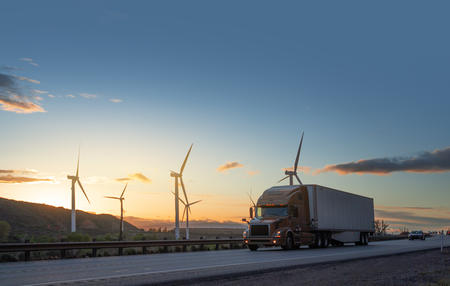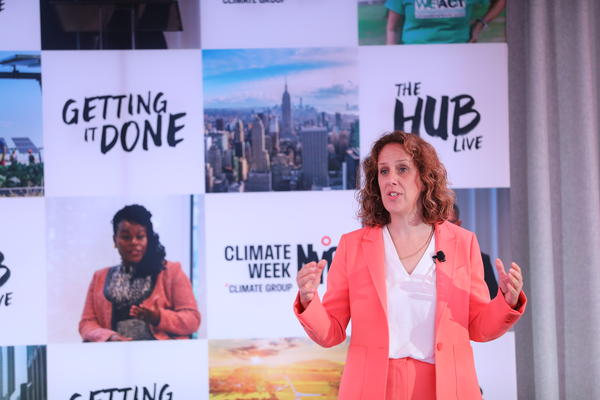Counting down to Climate Week NYC – 10 weeks to go
With Climate Week NYC only 10 weeks away, our CEO Helen Clarkson answers some urgent questions around the impact of the week, the challenges the world faces, and the role of business and governments in driving climate action, fast.
Speaking of challenges, what is the biggest one?
The biggest challenge is that even though many countries have committed to action on climate change, it’s not happening fast enough. Emissions continue to rise, and climate impacts are being felt every day. The oceans are warming rapidly, large parts of Canada’s forests have burned, and we’re seeing heatwaves across Europe, Asia and the US. That’s frightening.
There are great things happening, though – clean investment equalled fossil fuel investment in 2022 for the first time, and is set to overtake it in 2023. The US passed the Inflation Reduction Act with over $370bn to boost green tech, jobs, and energy security, provoking the EU to come up with its Green Deal Industrial Plan. And we’ve seen pro-climate politics lead to a change of government in Australia, which shows that in many parts of the world we know that the public is eager to see action on these issues.
That all sounds hopeful?
There’s much to be hopeful about, we’re so far ahead of where we were just a few years ago.
But every time the IPCC or other scientists release a climate report, we face the grim reality that our situation has worsened. We need bold action and leadership, but that’s difficult when climate discussions have been co-opted into cultural conversations rather than scientific ones.
Many leading companies are doing inspiring things within their own organization, but need to work with others to take it further. Through our RE100 initiative, for example, members commit to use 100% renewable electricity globally – but that’s really hard to achieve in Asian markets because of certain barriers. So, we’ve been bringing companies together to develop shared policy messages in South Korea and Japan, and we’re seeing some great success as we take those to policymakers.
That kind of leadership requires the forging of trusted bonds, it requires collaboration - and that’s exactly what we do at Climate Week NYC. And it’s why our theme this year is We Can. We will. Because we believe that together we can and will drive change. It’s happening, we will succeed, but we need to go faster. The ‘we’ is critical - no section of society can do this on its own.
Climate Week NYC’s interactive program The Hub Live will combine three major plenary flagship events, addressing the most pressing climate issues of our time, with four key themes. Let’s go over some of these four themes and why you chose them, starting with The New Industrial Revolution.
We need change at the scale of the Industrial Revolution - but without fossil fuels. During Climate Week NYC, we’ll be discussing the revolutionary changes that are already happening towards a net zero economy.
Steel for example, is hugely carbon intensive – it accounts for 7% of global emissions. But it’s vital for our future not just for new buildings, but also as a building block of the transition, steel is quite literally the pillar for windfarms.
A few years ago, there wasn’t much conversation around steel - it was just filed under ‘hard to abate’. Now we have well over 30 companies in our SteelZero campaign that have committed to buying 100% zero carbon steel by 2050. That’s an incredibly powerful signal to the market: "if you make it, we’ll buy it”.
And we’ll have discussions about different approaches to decrease climate impacts and improve the functionality of spaces at the same time: for example how we refurbish buildings so they can use the battery storage of electric cars plugged into their car parks to mitigate the variable input of their rooftop solar plant, and let companies sell electricity back to the grid at peak times.
The second one is Driving the Energy and Transport Transition
Some people might think the energy and transport transition are basically done. But transport is a great example of why we need to keep pushing and holding events like Climate Week NYC. The small vehicle revolution is well underway, and we have zero emission vehicle mandates in place, which are starting to trigger a response from car makers.
But we need to do more – charging networks need to keep up with the growth in EV-sales, or markets will sour. And the medium-to-heavy duty vehicle sector now needs to start electrifying at scale, with fresh commitments and approaches to action.
Similarly, the energy transition is gaining momentum, but there are still pockets where movement isn’t quick enough – in Asia, where a lot of our focus is, and Latin America similarly isn’t progressing quickly enough.

The third is Nature, Food Systems and Health. Why?
Our food system is one of the main drivers of climate change, responsible for a third of global emissions and for 30% of the world’s total energy demand – and also heavily dependent on transport. At the same time, the impact of climate change is exacerbating food insecurity.
Our current model is simply not sustainable. At Climate Week NYC, we’ll home in on deforestation, the circular economy, but also on actionable collaborations in the food supply chains – how did these collaborations come to be, what challenges did they overcome, what is the key to their success, and how can it be replicated?
And finally, Financing the Green economy.
The financial task we face is staggering: the OECD estimates we need $6.9 trillion a year to meet our climate and development goals. At the same time, richer governments have been grossly under-delivering even on their commitment to allocate US $100 billion a year to help developing countries adapt to the impacts of climate change.
So, there is a clear gap, and we need creative solutions to bridge it, for example through collaboration between the public and the private sector. Governments can create circumstances for private sector investment, through green procurement policies or incentives. This can prompt the private sector and financial organizations to reassess their risk appetite for projects they might not have considered initially.
The Inflation Reduction Act in the US is an incredible example of that, and we’ll be exploring its impact, and how it can unlock opportunities for the scaling up of cleantech, for example.
What will define the success of Climate Week NYC 2023?
Climate Week NYC has always been a launch pad for great corporate ideas and collaborative action. We’ve seen speeches that galvanized and inspired audiences, hundreds of organizations use the week to organize their own events to drive climate action. We bring people together, they meet, sometimes breakthroughs happen in one-on-one conversations.
All of this has made Climate Week NYC into a key event on the climate calendar, kickstarting international climate discussions throughout the fall.
For me, it’ll have been a success if I know we’ve been able to shift the needle on climate by igniting progress, nothing less. Only together, We Can. We Will drive climate action.
Climate Week NYC starts on Sunday, September 17 with the Opening Ceremony. On Monday and Tuesday, September 18-19, Climate Group hosts The Hub Live, Climate Week NYC’s interactive program for innovative solutions, technologies and ideas that drive forward climate action now.
